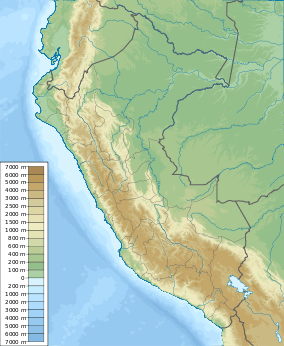Túcume is a pre-Hispanic site in Peru, south of the La Leche River on a plain around La Raya Mountain. It covers an area of over 540 acres (220 ha) and encompassing 26 major pyramids and mounds.[1] The area is referred to as Purgatorio (purgatory) by local people.
.jpg)
The Tucume mounds
This site was a major regional center, maybe even the capital of the successive occupations of the area by the Lambayeque/Sican (800-1350 AD), Chimú (1350–1450 AD) and Inca (1450–1532 AD). Local shaman healers (curanderos) invoke power of Tucume and La Raya Mountain in their rituals, and local people fear these sites. Hardly anyone other than healers venture out in this site at night.
The vast plains of Túcume are part of the Lambayeque region, the largest valley of the north coast of Peru. The Lambayeque Valley is the site of scores of natural and man-made waterways and is also a region of about 250 decaying brick pyramids.
See also
References
- ↑ Shimada, Izumi. "The Late Prehispanic Coastal States." In The Inca World: The Development of Pre-Columbian Peru, edited by L. Laurencich Minelli, pp.49-82. Norman: University of Oklahoma Press, 2000
External links
|
|---|
| |
- Acaray
- Arhuaturo
- Asana
- Asiru Phat'jata
- Aspero
- Awkillu Waqra
- Awkimarka
- Azángaro
- Baths of Boza
- Bandurria
- Buena Vista
- Cahuachi
- Cajamarquilla
- Cao Viejo
- Carajía
- Caral
- Caves of Sumbay
- Cerro Baúl
- Cerro Pátapo
- Cerro Trinidad
- Chan Chan
- Chankillo
- Chauchilla Cemetery
- Chavín de Huantar
- Chuqik'iraw
- Chuqi Pukyu
- Churajón
- Chuya
- Colcampata
- Cota Coca
- Cumbe Mayo
- El Brujo
- El Cañoncillo
- El Ingenio
- El Paraíso
- Garagay
- Gran Pajáten
- Gran Vilaya
- Guitarrero Cave
- Hatun Rumiyuq
- Huaca de San Marcos
- Huaca de Santa Ana
- Huaca del Dragón
- Huaca Huallamarca
- Huaca of the Moon
- Huaca of the Sun
- Huaca Prieta
- Inka Mach'ay
- Inka Raqay
- Inka Tampu, Huayopata
- Inka Tampu, Vilcabamba
- Inka Tunuwiri
- Inka Uyu
- Inka Wasi, Ayacucho
- Inka Wasi, Huancavelica
- Inka Wasi, Lima
- Inkill Tampu
- Inti Punku
- Intini Uyu Pata
- Inti Watana, Ayacucho
- Inti Watana, Písac
- Jinkiori
- Jisk'a Iru Muqu
- Kotosh
- Kuelap
- Kuntur Wasi
- Kusichaka valley
- Kutimpu
- K'anamarka
- Laguna de las Momias
- Lawriqucha
- Layzón
- Llaqtapata
- Machu Pikchu
- Mameria
- Marayniyuq
- Markansaya
- Markawamachuku
- Mawk'allaqta, Castilla
- Mawk'allaqta, Espinar
- Mawk'allaqta, La Unión
- Mawk'allaqta, Melgar
- Mawk'allaqta, Paruro
- Mawk'allaqta, Sandia
- Mayqu Amaya
- Mazur
- Mikulla
- Mirq'imarka
- Mulluqu
- Muray
- Miraflores
- Muyuq Marka
- Nazca Lines
- Ninamarka
- Ñawpallaqta
- Ñusta Hisp'ana
- Pachakamaq
- Pacatnamu
- Paiján
- Pañamarka
- Paracas Candelabra
- Patallaqta
- Phiruru
- Pikillaqta
- Pikimach'ay
- Pinkuylluna
- Pirqa Pirqa
- P'isaq
- Pucará del Cerro Mauco
- Puka Pukara
- Pukara
- Pukllana
- Pumamarka, San Sebastián
- Pumamarka, Urubamba
- Pumaq Hirka
- Punkuri
- Puruchuco
- Pusharo
- Phuyupatamarka
- Qillqatani
- Qillqa
- Qillqay Mach'ay
- Quiaca
- Qulu Qulu
- Qunchamarka
- Qurikancha
- Qurimarka, Apurímac
- Qurimarka, Cusco
- Quriwayrachina
- Q'inqu
- Q'inq'u
- Raimondi Stele
- Raq'chi
- Revash
- Rumiqullqa
- Rumiwasi
- Runkuraqay
- Saksaywaman
- Sayaqmarka
- Sayhuite
- Sechin
- Sillustani
- Sipán
- Suntur
- Tambo Colorado
- Tambo Totem
- Tampu Mach'ay
- Tanqa Tanqa
- Tantarica
- Taqrachullu
- Tarawasi
- Tarmatampu
- Tipón
- Titiqaqa
- Toquepala Caves
- Toro Muerto
- Trinchera Fortress
- Túcume
- Tunanmarka
- Tunay Q'asa
- Tupu Inka
- Uchkus Inkañan
- Ullantaytampu
- Usnu, Ayacucho
- Usnu, Huánuco
- Venado cautivo
- Ventarron
- Vitcos
- Wamanmarka, Chumbivilcas
- Wamanmarka, La Convención
- Wanuku Pampa
- Waqramarka
- Waqra Pukara
- Warawtampu
- Wari ruins
- Wari Willka
- Wayna Pikchu
- Wayra Punku
- Wichama
- Willkapampa
- Willkaraqay
- Willkawaman
- Willkawayin
- Wiñay Wayna
- Wiraquchapampa
- Yanaca
- Zorro Temple
|
|


.jpg)
